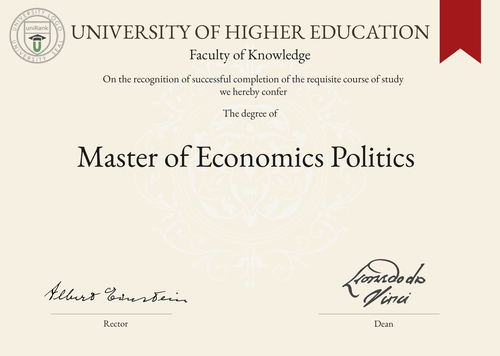
Master of Economics Politics (M.Econ.Pol.)
Guide to Master of Economics Politics Program/Course/Degree
Master of Economics Politics (M.Econ.Pol.)

Program Name:
Master of Economics PoliticsProgram or Degree abbreviation:
M.Econ.Pol.Duration range:
Varies by country and university, typically 1-2 yearsTuition range:
Varies by country and university, typically $10,000-$30,000 per yearOverview:
The Master of Economics Politics program is designed to provide students with a deep understanding of the intersection between economics and politics. It equips students with the analytical tools and knowledge necessary to analyze and address complex economic and political issues.Curriculum Overview by year:
The curriculum is structured to cover a wide range of topics related to economics and politics. In the first year, students typically study foundational courses such as microeconomics, macroeconomics, political theory and quantitative methods. In the second year, students have the opportunity to specialize in areas such as international economics, public policy, political economy, or economic development.Key Components:
- Microeconomics and Macroeconomics - Political Theory and International Relations - Quantitative Methods and Data Analysis - Specialization Courses (e.g., International Economics, Public Policy)Career Prospects:
Graduates of the Master of Economics Politics program have a wide range of career opportunities. They can pursue careers in government agencies, international organizations, research institutions, think tanks, consulting firms, or academia. They can work as economists, policy analysts, political advisors, researchers, or professors.Salary Expectations:
Salary expectations for graduates of the Master of Economics Politics program vary depending on factors such as location, industry and experience. On average, graduates can expect competitive salaries, with entry-level positions starting around $50,000 per year and experienced professionals earning over $100,000 per year. For a more accurate understanding of salary expectations, you can utilize the Job Sites Search Engine, from our sister site jobRank, which searches over 4,600 job sites worldwide. Make sure to specify not only the job title but also the country you are interested in.Conclusions:
It is important to note that the duration, tuition fees, curriculum, key components, career prospects and salary expectations of the Master of Economics Politics program can vary significantly depending on the country or location where you choose to study and the university you choose to attend. Prospective students are encouraged to research and compare different programs and institutions to find the best fit for their academic and career goals. Visitors interested in pursuing a Master of Economics Politics degree can use the uniRank World Universities Search Engine to explore and find universities offering this specific degree anywhere in the world.World Universities Search Engine
search for Master of Economics Politics (M.Econ.Pol.) and add the Location (country, state etc.) or specific University you are interested in studying at.
Query examples:
- Master of Economics Politics (M.Econ.Pol.) United States
- Master of Economics Politics (M.Econ.Pol.) United Kingdom online
- Master of Economics Politics (M.Econ.Pol.) Australia international students
- Master of Economics Politics (M.Econ.Pol.) University of California
- Master of Economics Politics (M.Econ.Pol.) University of London tuition fees
- Master of Economics Politics (M.Econ.Pol.) University of Sydney scholarships
Share Program/Course
Interesting? Share this program/course/degree info with your friends now.